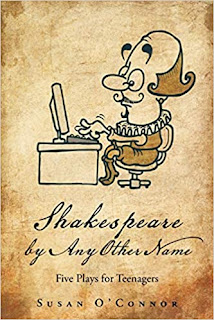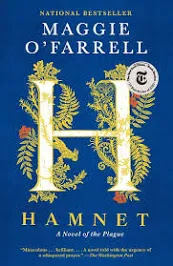Since the 18th Century William Shakespeare has been known as the Bard of Avon, the word bard a common name for a poet. In 1901 the word Bardolatry was coined by George Bernard Shaw, the famed creator of Eliza Doolittle in Pygmalion and later My Fair Lady, in the preface to his collection Three Plays for Puritans. Now, most of us know the word idolatry--the worship of a person or thing, or a kinder definition, excessive admiration. So you're thinking....yeah, yeah, William Shakespeare, that hard to understand dude we had to read in high school....
But through the centuries (four to be exact), let's look at what the icons of literature have had to say about the Bard:
Samuel Johnson referred to Shakespeare's work as "a map for life."
In 1796 actor David Garrick read a poem at the unveiling of a statue of Shakespeare in Stratford, "tis he, tis he/the God of our idolatry."
The Romantic poets Coleridge, Keats, and Hazlitt described Shakespeare as "a transcendent genius."
Voltaire was the main promoter of Shakespeare's work in France.
Thomas Carlyle in 1840 wrote, "This King Shakespeare, noblest, gentlest, indestructible."
Today Harold Bloom contends that Shakespeare "invented humanity."
Samuel Johnson wrote, "Shakespeare holds up to his readers a faithful mirror of manners and of life."
Excessive idolatry from the greatest literary geniuses? No, I don't think so.
When I was a high school student, only one Shakespeare play was offered in my four year tenure there, and that was Julius Caesar, sans history of the play, the life of the playwright, or history of the Elizabethan/Jacobean periods. It was not until grad school that I had my first, albeit ineffectual, Shakespeare course. To this day I cannot remember anything about it, but the next summer I joined 23 English teachers across the U.S. to learn about the Bard at Royal Holloway College, University of London in Englefield Green, U.K. It was there and later in Stratford that my real Shakespeare education began.
When I was many years into my teaching career, I had the pleasure of working with Dr. Sidney Berger of the University of Houston who shared his expertise in verse speaking, the art of using the iambic pentameter to express more accurately the verse lines of Shakespeare's plays and poems, something like built-in directions for speaking it correctly.
Teaching Shakespeare and his play Twelfth Night for almost 20 years was no doubt the highlight of my long career, with student performances, a Twelfth Night party, guest early music performances by the Baltimore Consort, Kate Pogue's Original Pronunciation production of Julius Caesar, and a Shakespeare workshop with students conducted by the one and only Ben Crystal, London actor, writer, producer.
In this same time frame, I took a group of students and their families on a literary tour of England and Scotland. While in London we participated in an actor's workshop at the Globe Theatre and that evening we saw Twelfth Night there, performed as it might have been in 1602, an all-male cast with horse hair wigs and pasty white faces. My students had just finished studying Twelfth Night with me, and prior to the show they made a visit to the gift shop and purchased six replica Elizabethan coins so that their teacher could buy the best seat in the house....with a cushion, all symbolic of course. Back home, I added these coins to my Shakespeare Shrine already full of memorabilia, including a Shakespeare action figure a student thought I needed.
I was also the drama teacher for several years, and I used this opportunity to infuse Shakespeare once more. I wrote five plays for teenagers based on five of my favorite Shakespeare comedies. Troy Scheid of Main Street Theatre Kids at that time directed three of them, and I later published the collection under the title Shakespeare by Any Other Name.
When the bones believed to be King Richard III were found buried under a car park in England and later identified as the king, pathologist Dr. Sarah Hainsworth, part of the team to verify the authenticity of the find, came to Houston to speak about this remarkable discovery at the Houston Museum of Natural Science. To add to the celebration, my students were asked to perform their Elizabethan dances to the music of the Baltimore Consort that evening, all part of our study of Shakespeare.
Every detail of my Shakespeare classroom was aimed at one goal: I wanted my students to know and love Shakespeare as much as I did. Was this my form of Bardolatry? Perhaps, but excessive admiration? Let me just mention here that the word excessive is relative. Right? Sort of like the word enough. Enough said.
In May 2021 Penguin Random House, Vintage Books, published Maggie O'Farrell's Hamnet, a novel of the plague in 16th century Europe and of Will Shakespeare and his wife Agnes (Anne was called Agnes in her uncle's will), and their children. When I finally got my copy and began reading it, I was confused. The story never mentions William Shakespeare by name, and yet it does specify all of the other people in his life. But the reader soon learns who the young Latin tutor who falls in love with the farmer's daughter Agnes Hathaway is. He hates working for his bully of a father; he needs more excitement in his life, a proper job, and yes, he writes. He asks for Agnes's hand in marriage. Although they are handfasted, her stepmother refuses him. Agnes decides the only way to keep her man is to have his child, and the rest is history. They marry and live with the Shakespeare family, his parents and siblings. Will is unhappy with his life, this home situation in particular. He doesn't want to be a Latin tutor or a glovemaker like his father. Agnes realizes his distress and secretly arranges for him to work in London in the glove market for his father. This doesn't last--it's not Will's dream, and Will the Latin tutor becomes Will the playwright and actor on the London stage, ultimately The Globe. His plan is to have Agnes move to London with the children and live with him, but it never materializes.
The story is not without heartache and tears (this reader's, too). Agnes and their three children miss Will, who is gone for months, even a year at a time. Although he buys her New Place, the second largest house in Stratford, what the intuitive farm girl-herb collector-healer really wants is her husband.
Hamnet is not only the story of the plague and its victims, shutting down the London theatres, death snatching away loved ones in Stratford. It is also a tale that turns the iconic Shakespeare, the greatest writer the world has known, into a living, breathing, imperfect man who in the end grieves over the death of his son the way other parents have surely always done. This kind of pain makes it easy to forget it was fiction. I personally wept continually over the last three pages. (Wait for it.)
So you ask, what have you learned about Will Shakespeare, Bard of Avon, that contributes to your own Bardolatry? My answer is this--that the second-best bed left to Agnes in his will was the marriage bed and not a slight to his beloved wife, that the poet loved his family, that according to the human spirit that pulls us toward those heartfelt needs in all of us, he had to find his own way in life to be true to his brilliant indomitable calling. So little is known about William Shakespeare beyond legal and church documents. The fact that Maggie O'Farrell scrutinized copious records and archives that covered Elizabethan life, the theatre and the two families is confirmation enough to imagine what Will's personal struggles as well as his triumphs might have been. What we must remember, if the plays are truly a reflection of our own joys and sorrows, is that he was a man. Brilliant, but in the end he was just a man and this makes me love him even more. Excessive admiration? Not even close.











As always, you have opened a new "Door of Learning" for me. Thank you for continuously being my most admired teacher. Hugs
ReplyDelete